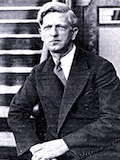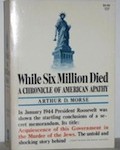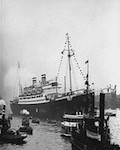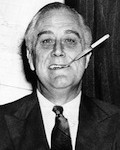James G. McDonald (1886-1964), scholar, journalist, and diplomat, served as the League of Nations High Commissioner for Refugees Coming from Germany from 1933 to 1935, was a member of the U.S. delegation to the Evian refugee conference in July 1938, and chaired the President’s Advisory Committee on Political Refugees from 1938 to 1945.
McDonald’s efforts consistently met with frustration. Burdened by the need to raise the funds for his work, McDonald secured a pledge from President Franklin D. Roosevelt to give an initial U.S. contribution of $10,000, which McDonald hoped would inspire other countries to follow suit. However, FDR never came through with that contribution. McDonald resigned in protest from the League of Nations refugees commission in December 1935 over the failure of the international community to pay anything but “lip service” to the plight of Jews fleeing Hitler.
The Evian conference of 1938 achieved next to nothing, because of the refusal of the United States and other countries to open their doors to more refugees. The President’s Advisory Committee was severely limited in its effectiveness by the fact that its advice was almost always ignored by the president. In 1939, President Roosevelt told McDonald he would consider asking Congress to appropriate $150-million for a large-scale refugee resettlement program, but FDR never sought those funds.
During the 1930s, both during his term as High Commissioner and afterwards, McDonald never publicly criticized the Roosevelt administration’s refugee policy. Beginning in early 1943, however, there was a noticeable change in the tone of McDonald’s statements.
After the Allies announced, in early 1943, plans to hold a lengthy discussion of the refugee problem (which eventually became the Bermuda conference), McDonald declared in a speech
that “the time for lengthy discussion of this problem is long past.” Instead of talk, the Allies needed to take “immediate emergency measures to save the Jewish remnants of Europe.” He dismissed the Roosevelt administration’s plans for settling small number of refugees in varios parts of the world as “palliatives that hardly stand critical examination. The obvious first step lies close at hand. It is offered by Palestine.” In a March 1943 article, McDonald blasted the Allies’ “old-time diplomacy with its…niggling approach…dilatory commissions, White Papers, endless discussions and committees and unwillingness to face the peremptory need for bold planning and prompt action.”
Addressing a B’nai B’rith conference in Buffalo, NY in May 1944, McDonald charged that the United States “paid only lip service” to the plight of Hitler’s Jewish victims before the war and “declined to make these crimes a major issue.” He said “timidity and fear of not being re-elected” were to blame for indifference to the plight of Jews in Nazi Germany.
Later that year, speaking to a United Palestine Appeal event in Chicago, McDonald described the Allies’ response to the Holocaust as “pitifully insufficient” and pointed to “the sorry contrast between the noble sentiments so generously expressed by statesmen and the grossly inadequate actions of most governments and intergovernmental agencies.” He also accused the Allies of “hesitancy, procrastination, half-heartedness or negativism,” “calamitous blindness,” and “indifference.”
After the war, McDonald served on the Anglo-American Committee of Inquiry on Palestine, and subsequently became the first U.S. ambassador to the State of Israel.
The first documentary film about McDonald, A Voice Among the Silent, by Shuli Eshel, debuted on Capitol Hill in April 2014, at a Holocaust Memorial Day event hosted by Congresswoman Donna Christensen.
Sources: Wyman, Paper Walls, pp.31-32, 146-147;
Medoff, FDR and the Holocaust, pp.151-154, 249-251;
Penkower, “Honorable Failures against Nazi Germany.”











